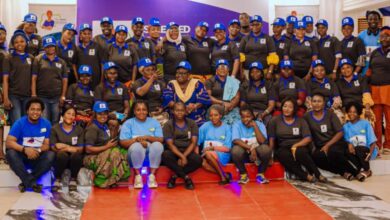How Nestle Nigeria Helping In Tackling Nigeria’s Vulnerability To Climate Change
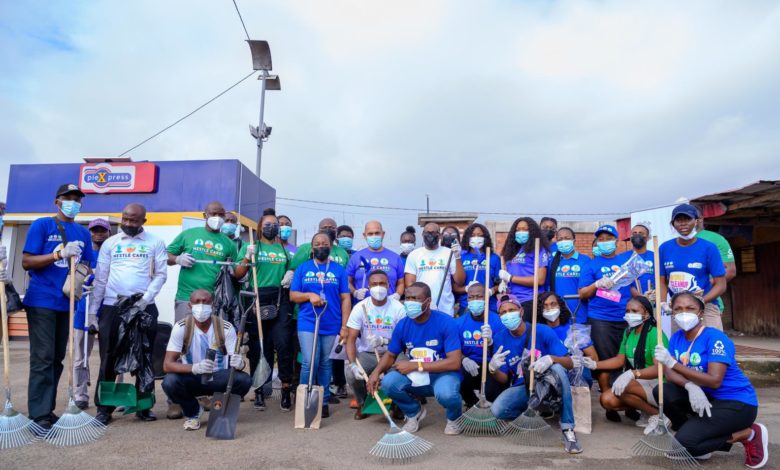
Nestle Volunteers with the Managing Director/CEO, Wassim Elhusseini, during World Clean up Day in Lagos.
By EDET UDOH
According to the University of Notre Dame, Global adaptation index (GAIN) 2017, on climate change, Nigeria is adjudged the most vulnerable country followed by Ghana, Liberia while South Africa is the least vulnerable country in Africa.
Out of the 181 countries surveyed, Nigeria is considered 58th most vulnerable and the 22nd least ready country to adapt.
Vulnerabilities include exposure, sensitivity and adaptive capacity. Exposure is the degree to which people and the things they value could be exposed to climate variation or change; sensitivity is the degree to which they could be harmed by that exposure and adaptive capacity is the degree to which they could mitigate the potential for harm by taking action to reduce exposure of sensitivity.
The climate change vulnerability assessments take into consideration the exposure level, sensitivity, potential impact, and adaptive capacity.
Responding to climate threats requires collective action. Experts opined that the government must provide leadership by creating and championing a framework with clear goals, roles and responsibilities including amongst others, platforms for engagement with key stakeholders required to achieve climate readiness, improve decision-making, develop strategies and ensure implementation.
It is on the basis of ensuring that collective action is taken on the issue of climate change, that Nestle Nigeria, the Good Food, Good Life company, has taken it upon itself to deepen awareness of climate change and climate change-related issues in a bid to help in tackling Nigeria’s vulnerability to climate change challenges.
Every year, apart from participating in World Environmental Day where the company invites volunteers including journalists covering, Health/Nutrition, Agriculture, Environment, Business & Economy to join its staff in the programme across the country, the company assembles professionals from Agriculture, Environment, Business, Health/Nutrition, Economy to speak and brainstorm on the need to preserve the environment, ensure economic growth, promote thriving agriculture, and ensure the prosperity of the people amongst other issues aimed at assuaging and mitigating the impact and effect of the menace.
The company also ensures the donation of waste disposal materials to schools and also trains those the company called ‘Sustainability Champions’ who will ensure effective and proper waste management in the school as well as become catalysts for environmental sustainability.
In order to ensure food security for the ever-growing Nigerian population, the company is fully in support of the regenerative agriculture initiative.

L-R: Mr. Adeyemi Olalekan, Education Secretary, IfakoIjaiye Local Education Authority; Dr Hassan Sanuth, Director Sanitation Services, Lagos State Ministry of Environment; Edidiong Peters, Public Affairs Specialist Nestle Nigeria; Chief George, Baale of Idiagbon community, IfakoIjaiye; Mrs. Owoyemi Olabisi, Director, Admin and HR, Lagos State Ministry of Environment and Mrs. Monsurat Banire, Lagos State Ministry of Environment during 2021 World Environment Day.
Speaking on the topic: ”Climate Change, Nutrition and Food Security – Exploring The Linkages,” at the 2022 edition of Nestle’s “Advancing Nutrition and Environmental Awareness Through The Media,”a special media training organized by Nestle Nigeria in partnership with the Lagos Business School Sustainability Centre, Mr. Amara Nwankpa, Director, Public Policy Initiatives at Shehu Musa Yar’Adua Foundation gave insights on Nigeria’s level of vulnerability to climate change, sensitivity factors, highly vulnerable areas and also made recommendations on how to deal with the situation.
According to him, in terms of exposure to projected flood hazards, the Coastal Nigeria of Niger, Benue, Gongola, and Sokoto flood plains and flat low-lying areas near Lake Chad are most vulnerable, especially during periods of heavy rainfall.
Amara said Nigeria will be particularly sensitive to climate impacts due to the following factors: Food import dependency; Agriculture capacity; Age Dependency Ratio; Trade Transportation Infrastructure; Health; Access to Electricity, etc.
On Food import dependency, he said 9.2% of cereals consumed in Nigeria are imported, adding that the World Bank said Food accounts for 17% of the value of all merchandise imports. A drastic drop in oil incomes since 2014 and a near 50% devaluation of the naira highlighted the risk of dependence on imports.
On agriculture capacity, Amara said that Less than 1% of arable land equipped with irrigation translating to 6.7 tractors/agricultural machinery per 100sq km of arable land is inadequate.
According to him, as of 2016, Nigeria has the 17th highest age dependency ratio in the world with 88.9 million. Out of this figure, 81 million or 42.5% are youths of 14 years or younger while 5.97 million or 3.23% are 65 years and older. 18.8% are unemployed as at 2017.
On Trade and Transport Infrastructure, Amara said Nigeria has only 15% paved roads rated 2.45/5 (average) by the World Bank Development Index.
On health, he said 3.7% of the country’s Gross Domestic Product (GDP) is expended on healthcare with grossly inadequate medical staff, 0.38 physicians attending to 1,000 populations.
On access to electricity, he said 61% of rural households not connected to the national grid. The country’s average grid availability is 54% translating to 13 hours per day. This is impacting negatively on farmers’ ability to preserve foods as they can’t store food because there is no electricity or storage system.
Another cause of Nigeria’s vulnerability, according to Amara Nwankpa, is the refusal by the government to domesticate the International Environmental Conventions such as Paris Agreement in the nation’s national and sub-national legislation.

Nestle volunteers with heaps of waste recovered from Arena Market during the 2021 World Clean Up Day
The accord calls for limiting the global average temperature rise in this century to well below 2 degrees Celsius while pursuing efforts to limit the temperature rise to 1.5 degrees.
Nestle Nigeria is in full support of this global initiative in the following practical ways– support for regenerative agriculture, restoration of the environmental ecosystem, training of future sustainability champions in various schools across the country, provision of waste management materials in some markets and schools across the country, participation in annual International Environment Day, piloting and entrenching the culture of proper waste management and encouraging its staff to participate in plastic waste collection.
Participation in International Environmental Day
In line with its global commitment to preserving the environment, every year, over 200 Nestlé volunteers in Nigeria participate to mark the World Clean-up Day to rid our planet of trash – cleaning up litter and mismanaged waste from our beaches, rivers, forests, and streets, removing and properly disposing of over 3,000 kg waste from the environment.
World Clean-up Day unites countries, communities, and volunteers across the world for clean-up exercises, promoting the need for proper management of waste and raising global awareness and action for a cleaner planet.
Speaking at the clean-up exercise in Lagos where he joined his team, Wassim Elhusseini, Managing Director and CEO of Nestlé Nigeria PLC said, “At Nestlé Nigeria, we continue to take progressive steps on the journey towards ensuring a waste-free future in line with our global commitment to preserving the environment.
“We are committed to leading lasting and impactful change in tackling waste pollution through initiatives like this clean-up exercise. We not only contribute to driving solutions by taking concrete action, but we also aim to raise awareness and promote behavioural change on proper waste management, beginning within our company. I am therefore happy to see over 200 Nestlé Cares volunteers joining the cleanup exercise in markets across Nigeria.”
Nestlé Nigeria has continued to collaborate with other stakeholders and partners to take action to protect the environment.
Alexander Akhigbe, Founder/CEO African Clean-up Initiative, implementing partner for the Nestlé Cares cleanup exercise said, “We are delighted to work with Nestlé for World Cleanup Day every year. The challenge of indiscriminate waste disposal is glaring and requires sustained multi-sector efforts to address. Everyone has a role to play in keeping the environment clean, as this is the only planet we have.
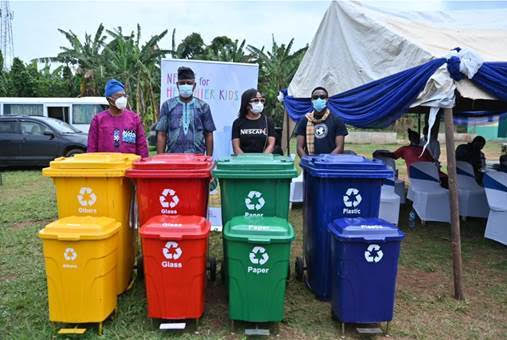
Nestle donates waste management equipment to schools and communities to tackle waste challenges and save the environment.
In 2018, the company revealed that it was taking steps globally to promote environmental sustainability through well-orchestrated efforts based on three pillars, namely: The first is to phase out all non-recyclable or hard-to-recycle plastics and replace these with alternative materials that are recyclable or even biodegradable by 2025.
The second pillar is to achieve a waste-free future by driving projects to prevent further accumulation of plastic in the environment and also collaborating with stakeholders and organizations to achieve this;
The third pillar is driving behavioural change through education and awareness beginning within the organisation.
Training of Sustainability Champions
Nestlé Nigeria in collaboration with the International Climate Change Development Initiative (ICCDI) for schools under the Nestlé for Healthier Kids programme in Ogun State has trained about 800 sustainability Champions between 2021 and 2023.
During the maiden edition of the training, more than 150 children in primary five classes at St Paul’s Anglican School, Obafemi Owode and Salvation Army Primary School 1, Agbara, both in Ogun State were trained for six weeks, on a more sustainable approach to managing and recycling waste, in a bid to instill responsible behaviours and enable them to become better stewards of our planet.
Commenting on the training, the Corporate Communications and Public Affairs Manager for Nestlé Nigeria, Victoria Uwadoka said, “I am excited at the interest and passion of the children throughout the training. Learning about simple measures for preserving the integrity of the environment like waste sorting and conversion of waste to useful products are valuable lessons for children enabling them to inculcate the right habits at an early age’.
“As a company, we are committed to protecting the environment for future generations. Equipping children with the right information to develop healthy lifestyles is a key part of achieving this commitment. We hope to extend the reach and scale of the training in the near future”, she said.
Speaking at the closing event, Olumide Idowu, founder of the International Climate Change Development Initiative said, “Young people are like seeds. When watered and well-nourished, they blossom and become radiant. Through the training, the children are better informed on their responsibilities in caring for the environment.
The practical sessions were particularly instructive with the children learning on the creation of useful items like side tables “Ottoman” out of waste pet bottles. Actions such as these, do not only help to address the challenge of the indiscriminate litter of the environment, but also assist with the reduction in the use of wood from trees by 70%, ultimately protecting our environment”.
Also speaking at the event, the Director, Social Mobilization Ogun State Universal Basic Education Board, Mr. Olusegun Alade said, “The Board appreciates the consistent support of Nestlé Nigeria for the training and development of Ogun State Children. It is heart-warming to see children create functional items out of waste materials. I strongly encourage the children to utilize the knowledge acquired in the last six weeks not only in school but also at home, particularly during their holidays”.
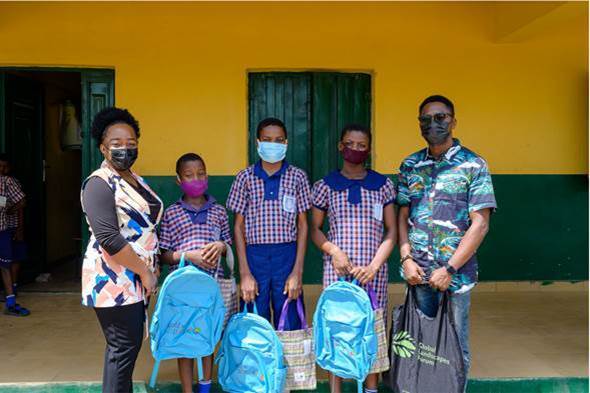
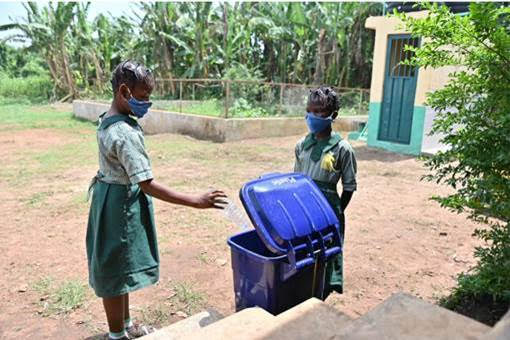
….Trains Sustainability Champions – School pupils after six weeks of Environmental sustainability training.
The exceptional students in both schools took home prizes, expressing their joy at participating in the training and being recognized for their efforts and performance.
Nestlé for Healthier Kids (N4HK) is the company’s flagship initiative which aims to help 50 million children globally lead healthier lives by 2030. In Nigeria, N4HK incorporates a school-based nutrition education programme, which helps children imbibe healthy habits including good nutrition, active lifestyles through adequate physical activity, good hygiene practices and healthy hydration.
Collaboration on Ecosystem Restoration
In its bid to ensure full restoration of the ecosystem, Nestle Nigeria has continued to encourage collaborative initiatives with other institutions and organizations, especially in the areas of tree planting with the target of planting 50,000 trees every year.
Nestle Nigeria, in 2021, as its first step, partnered with Lagos State Ministry of Environment on Ecosystem Restoration during the World Environment Day which is celebrated on the 5th of June annually to raise global awareness and action for the protection of the environment.
Safeguarding the environment is a collective responsibility and Nestlé is delighted to partner with the Lagos State Ministry of Environment on this initiative to leverage nature’s own solutions to reduce carbon footprints to help slow down climate change.
Speaking on the collaboration on World Environment Day, the Corporate Communications and Public Affairs Manager, Nestlé Nigeria PLC, Victoria Uwadoka said, “Natural resources are shared by everyone and must be preserved for people today and for generations to come. Our partnership with the Lagos State Ministry of Environment on Ecosystem Restoration is in line with our commitment to protect the environment for future generations.
“Trees do not only provide aesthetic value but also optimize air quality. According to a popular proverb, the best time to plant a tree is 20 years ago and the second-best time is now, so we are taking action together, today.”
Speaking at the tree planting, Dr Hassan Sanuth, Director Sanitation Services Department, Lagos State Ministry of Environment and Water Resources who represented the Permanent Secretary of the Ministry said, “The call to action on Ecosystem Restoration for this year’s celebration recognizes the need to massively accelerate restoration of our ecosystems, pushing to halt and reverse the decline of the natural world. The huge social and economic development in the state has also had some negative impacts on the environment. Many communities in Lagos State are named after landmark ecosystems that, unfortunately, have been destroyed by the activities of mankind. We all need to act together in making sure we restore the environment to serve us better”.
Support for Regenerative Agriculture
Nestlé has laid out plans to support and accelerate the transition to a regenerative food system –one that aims at protecting and restoring the environment, improving the livelihoods of farmers and enhancing the well-being of farming communities by working with its food system partners, including the company’s network of more than 500,000 farmers and 150,000 suppliers, to advance regenerative farming practices at the heart of the food system.
The announcement was made in the lead-up to the UN Food Systems Summit in New York, as part of Nestlé’s contribution to help achieve the Sustainable Development Goals (SDGs) by 2030. It also follows the recent report from the United Nations’ Intergovernmental Panel on Climate Change that shows the climate crisis is intensifying.
“We know that regenerative agriculture plays a critical role in improving soil health, restoring water cycles, and increasing biodiversity for the long term,” said Paul Bulcke, Chairman of Nestlé. “These outcomes form the foundation of sustainable food production and, crucially, also contribute to achieving our ambitious climate targets.”
Nestlé is a signatory of the then Business Ambition for 1.5°C pledge and was one of the first companies to share its detailed, time-bound climate plan in December 2020. The company is taking measures to halve its emissions by 2030 and achieve net zero by 2050.
Nestlé has invested CHF 1.2 billion over five years to spark regenerative agriculture across the company’s supply chain, using three primary levers to help farmers adopt regenerative practices by applying state-of-the-art science and technology, providing technical assistance -Leveraging its vast network of research and development experts and agronomists, Nestlé is, for example, developing higher-yielding coffee and cocoa varieties with lower environmental impact and assessing novel solutions to reduce emissions in the dairy supply chain. Nestlé also offers agricultural training and helps farmers exchange information and best practices that can be adapted locally.
They offer investment support knowing that the transition to regenerative agriculture comes with initial risks and new costs. Nestlé is supporting farmers by co-investing with them, facilitating lending, or helping them obtain loans for specific equipment. The company also works with partners to fund pilot projects to test and learn how best to advance regenerative agriculture.
In paying premiums for regenerative agriculture goods, Nestlé is offering premiums for many raw materials produced using regenerative agriculture practices and buying bigger quantities. This means rewarding farmers not only for the quantity and quality of ingredients but also for the benefits they provide to the environment through soil protection, water management, and carbon sequestration.
Experts Recommendations
Experts call for climate readiness action that includes improving governance and stakeholder engagement; provision of information and accounting systems; establishment of knowledge and information services, and development of climate-smart agricultural strategy and implementation framework that builds community-level capabilities.
Governance And Stakeholder Engagement: Designate a lead ministry or inter-ministerial body to manage and coordinate climate readiness activities with clear decision-making processes and transparency. Make sure institutional roles are clearly defined by creating and sustaining platforms for stakeholder engagement and consultation, including the private sector.
Ensure inclusion of affected and vulnerable groups, such as smallholders, indigenous communities, and women.
Knowledge Base And Information Services: Assess the vulnerability and adaptation needs of farmers and the agricultural sector. Classify agricultural production systems according to adaptation needs and mitigation opportunities.
Identify options and priorities for climate-smart agriculture, including reduction of agriculture greenhouse gas emissions. Make climate information services available and accessible to farmers and other agricultural decision-makers. Analyse and reform current land use practices and legislation to support climate-smart agriculture. Ensure social and environmental impacts of climate-smart agriculture programmes are anticipated before they are scaled up, particularly for
Climate-Smart Agricultural Strategy and Implementation Frameworks: Formulate a vision and goals for the agricultural sector that ensures buy-in from stakeholder groups. Balance food security, adaptation and mitigation and the need to meet United Nations Sustainable Development Goals.
Ensure climate-smart agriculture interventions are analysed for social and biophysical suitability. Identify and pursue priority interventions that reduce vulnerability. Ensure projects are viable and sustainable. Make provisions for programme monitoring and improvement
Community Level Capabilities: Make credit available to rural farmers who implement climate-smart practices. Establish and improve access to seed banks with high-yield seeds.
Provide effective technical support and agricultural extension service. Galvanize private sector and rural farmer organizations, including women and youth, to support innovation, learning and implementation of climate-smart agriculture practices.
Information And Accounting Systems: Establish criteria and measurable indicators for resilience, climate change mitigation and food security. Create monitoring systems for climate threats and vulnerability assessments. Develop a national system to measure, monitor, report, and verify GHG emissions and multiple-benefit indicators in coordination with other monitoring activities.





